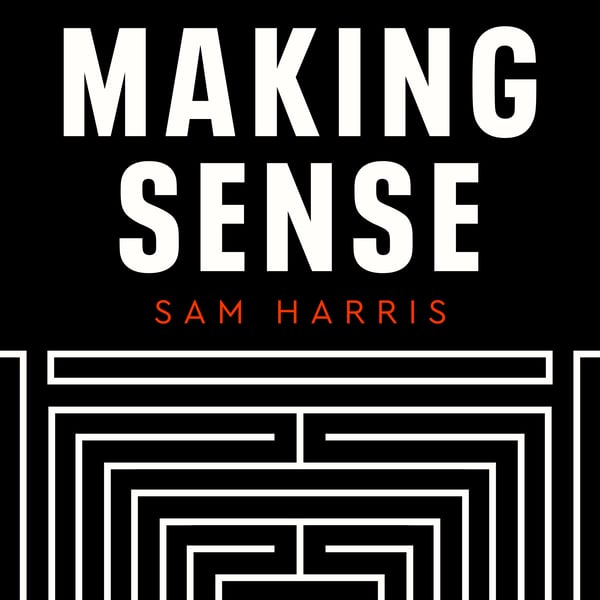#336 — The Roots of Identity Politics
Making Sense with Sam Harris
Waking Up with Sam Harris
4.6 • 29.1K Ratings
🗓️ 27 September 2023
⏱️ 62 minutes
🧾️ Download transcript
Summary
Sam Harris speaks with Yascha Mounk about identity politics. They discuss Yascha’s concept of the “identity synthesis,” skepticism about “cancel culture,” racial segregation in schools, the ideological change on college campuses, Michel Foucault and postmodernism, the rejection of universalism, Derrick Bell, Kimberlé Crenshaw, the “permanence of racism,” the indoctrination of children, intersectionality, white privilege, institutional racism, equity vs equality, racial preferences during the Covid pandemic, the asymmetric advantage of authoritarianism, class and elitism, affirmative action, media coverage of crime and violence, social media and the business model of mainstream journalism, and other topics.
If the Making Sense podcast logo in your player is BLACK, you can SUBSCRIBE to gain access to all full-length episodes at samharris.org/subscribe.
Learning how to train your mind is the single greatest investment you can make in life. That’s why Sam Harris created the Waking Up app. From rational mindfulness practice to lessons on some of life’s most important topics, join Sam as he demystifies the practice of meditation and explores the theory behind it.
Transcript
Click on a timestamp to play from that location
| 0:00.0 | Welcome to the Making Sense Podcast. This is Sam Harris. Just a note to say that if you're |
| 0:12.1 | hearing this, you are not currently on our subscriber feed and will only be hearing |
| 0:16.2 | the first part of this conversation. In order to access full episodes of the Making |
| 0:20.4 | Sense Podcast, you'll need to subscribe at SamHarris.org. There you'll find our private |
| 0:25.3 | RSS feed to add to your favorite pod catcher, along with other subscriber-only content. We |
| 0:30.6 | don't run ads on the podcast, and therefore it's made possible entirely through the support |
| 0:34.6 | of our subscribers. So if you enjoy what we're doing here, please consider becoming one. |
| 0:47.0 | Today I'm speaking with Yasha Malk. Yasha is a writer and academic, |
| 0:53.6 | known for his work on the rise of populism and the crisis of liberal democracy. He was born in |
| 1:00.4 | Germany and holds a degree in history from Cambridge and a PhD in government from Harvard. He is |
| 1:08.5 | currently a professor of international affairs at Johns Hopkins and the founder of the digital |
| 1:13.3 | magazine Persuasion. He's also a contributing editor at the Atlantic, a senior fellow at the |
| 1:18.8 | Council on Foreign Relations and host of the Good Fight Podcast. His most recent book is the |
| 1:24.6 | Identity Trap, a story of ideas and power in our time. And that is what we discuss. We talk about |
| 1:31.9 | the origins of identity politics, his concept of the identity synthesis, skepticism as to whether or |
| 1:38.2 | not any of these ideas are a problem, racial segregation in schools, the ideological changes that |
| 1:44.6 | have occurred on college campuses, the contributions of Michelle Foucault and postmodernism, |
| 1:51.5 | the rejection of universalism and objectivity, Derek Bell, Kimberly Crenshaw, |
| 1:57.6 | the imagined permanence of racism, the indoctrination of children, intersectionality, white privilege, |
| 2:05.3 | institutional racism, equity versus equality, racial preferences during the COVID pandemic, |
| 2:11.9 | the asymmetric advantages of authoritarianism, class and elitism, affirmative action, |
| 2:18.8 | media coverage of crime and violence, social media and the business model of mainstream journalism |
... |
Please login to see the full transcript.
Disclaimer: The podcast and artwork embedded on this page are from Waking Up with Sam Harris, and are the property of its owner and not affiliated with or endorsed by Tapesearch.
Generated transcripts are the property of Waking Up with Sam Harris and are distributed freely under the Fair Use doctrine. Transcripts generated by Tapesearch are not guaranteed to be accurate.
Copyright © Tapesearch 2025.

